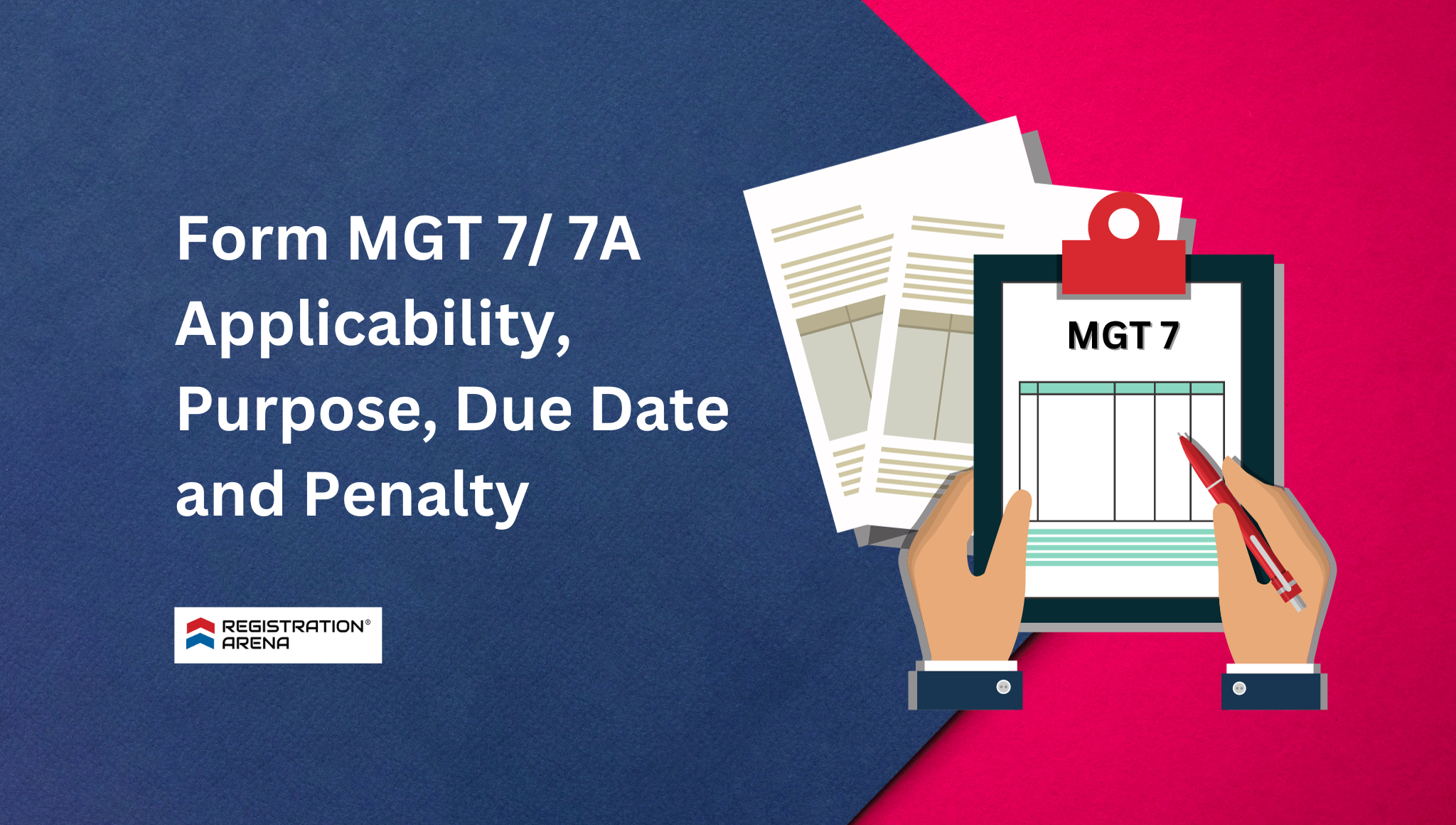The Ministry of Corporate Affairs (MCA) governs and regulates companies in India. During a financial year, several changes take place in a company like changes in share capital, promoters, directors, key managerial personnel, etc. Therefore, companies must report all such changes and other information to the government and other stakeholders. Companies report such information in the form of an annual return in Form MGT 7/ 7A. In this article, we will discuss all the aspects of Form MGT 7/ 7A right from its applicability to the consequences of non-compliance.
Applicability of Form MGT 7/ 7A
According to Section 92 of the Companies Act, 2013, all the registered companies shall prepare and file their annual return in Form MGT 7 with the Registrar of Companies (ROC) for every financial year. However, the Central Government has prescribed an abridged form of annual return for One Person Company (OPC) and Small Company. Such companies shall file their annual return in Form MGT 7A.
In the annual return, the companies shall provide information relating to their shares and securities, members, debenture holders, promoters, directors, etc. In addition, if the company has a website, then it shall place a copy of its annual return on the website and a link to the same shall be given in the board report as well.
Therefore, filing Form MGT 7/ 7A is one of the annual compliance requirements of a company.
Note –
- One Person Company means a company in which there is only one member or shareholder.
- Small Company means a company (other than a public company) whose paid-up share capital does not exceed Rs. 4 crores and whose turnover does not exceed Rs. 40 crores in the previous financial year.
Information Required in Form MGT 7/ 7A
The following information is required to be entered in Form MGT 7/ 7A.
- Registration and Other Details – In this part, general information about the company like its name, address, CIN, contact details, etc. shall be provided along with the date of the AGM and listing status.
- Principal Business Activities of the Company – Companies shall disclose their principal business activity in this section of the form.
- Particulars of Holding, Subsidiary, and Associate Companies (Including Joint Ventures) – In this part, companies shall enter information about their group companies like holding/subsidiary/associate company or joint venture, if any.
However, in Form MGT 7A, small companies are required to enter details of associate companies only. This section does not apply to an OPC.
- Share Capital, Debentures, and Other Securities of the Company – Companies shall provide details of shares and their transfer, outstanding debentures, and other securities issued by it.
- Turnover and Net Worth of the Company – In this part, companies shall enter their annual turnover and net worth.
- Shareholding Pattern – Promoters and Public (Other than Promoters) – In this part, the shareholding pattern of the company shall be disclosed i.e., the number and percentage of equity and preferences shares held by promoters and public. It does not apply to an OPC.
- Number of Promoters, Members, Debenture Holders – Companies shall enter the number of their promoter, members, and debenture holders in this section.
- Details of Directors and Key Managerial Personnel – In this part, details of directors and Key Managerial Personnel (KMP) shall be provided by the company. This section is not a part of Form MGT 7A.
- Meetings of Members/ Class of Members/ Board/ Committees of the Board of Directors – Companies shall enter details of all the types of meetings held during the year viz. General Meetings, Class Meetings, Board Meetings, and Committee Meetings. This section does not apply to an OPC.
- Remuneration of Directors and Key Managerial Personnel – In this part, companies shall provide information about the remuneration given to directors and Key Managerial Personnel.
However, in Form MGT 7A, only details about directors’ remuneration is required to be provided.
- Matters related to Certification of Compliances and Disclosures – Companies shall disclose whether they have complied with the applicable provisions of the Companies Act, 2013 or not. If not complied, reasons shall also be provided.
- Penalty and Punishment – In this part, companies shall enter details of the imposed penalties and compounding of offenses.
- Disclosure of whether the complete list of shareholders, and debenture holders has been enclosed as an attachment or not(Not a part of MGT 7A)
Attachments of Form MGT 7/ 7A
The following table shows the list of attachments to be enclosed with Form MGT 7/ 7A.
| S. No. | Form MGT 7 | Form MGT 7A |
| 1 | List of Shareholders and Debenture Holders | List of Shareholders and Debenture Holders |
| 2 | Approval Letter for Extension of AGM (if an extension was sought) | Approval Letter for Extension of AGM (if an extension was sought) |
| 3 | Copy of MGT 8 (Certification of Annual Return by Practising CS) | List of Directors (Mandatory for Small Companies) |
| 4 | Optional Attachments (if any) | Optional Attachments (if any) |
Signing of Form MGT 7/ 7A
Form MGT 7 shall be signed by a director and company secretary of the company. If the company is not required to appoint a company secretary, then it shall be signed by a Practising Company Secretary.
Form MGT 7A shall be signed by the company secretary of the company. If the company is not required to appoint a company secretary, then it shall be signed by a director of the company.
In any case, the person signing the form shall declare that the company authorizes him to sign the form and that the information furnished is true and correct.
Due Date for Filing Form MGT7/ 7A
Form MGT 7 and MGT 7A shall be filed with the ROC within 60 days from the date of the Annual General Meeting (AGM) of the company.
However, if the AGM of the company is not conducted for any year, then the forms shall be filed within 60 days from the due date of the AGM along with a statement showing reasons why the AGM was not held and filing fees/ additional filing fees, as the case may be.
The due date for holding an AGM is 6 months from the end of the financial year i.e., 30th September each year. Therefore, 29th November is generally the last date to file Form MGT 7/ 7A.
Don’t wait for the last date, Connect with our experts and file the form now!
Fees for Filing Form MGT7/ 7A
It can further be divided into the following 2 categories.
For Companies Having Share Capital
The fees for filing Form MGT 7 / 7A depend on the authorized share capital of the company. The following table shows the applicable fees –
| S. No. | Authorized Share Capital | Filing Fees (per document) |
| 1 | Less than Rs. 1,00,000 | Rs. 200 |
| 2 | Rs. 1,00,000 – Rs. 4,99,999 | Rs. 300 |
| 3 | Rs. 5,00,000 – Rs. 24,99,999 | Rs. 400 |
| 4 | Rs. 25,00,000 – Rs. 99,99,999 | Rs. 500 |
| 5 | Rs. 1,00,00,000 or more | Rs. 600 |
For Companies Not Having Share Capital
Rs. 200 per document is the standard fee for filing Form MGT 7/ 7A.
Certification of Annual Return – Form MGT 8
The annual return of certain companies shall be certified by a Practising Company Secretary in Form MGT 8. The company secretary shall certify that the annual return of the company discloses correct and adequate facts and that the company complies with the provisions of the Companies Act, 2013.
The following are the classes of companies that require certification of annual returns –
- Listed Companies;
- Companies having paid up share capital of Rs. 10 crores or more;
- Companies having a turnover of Rs. 50 crores or more.
Further, if the Practising Company Secretary does not follow the provisions and rules for certification of annual return, he shall be liable to a penalty of Rs. 2 lakhs.
Consequences of Non-Compliance
If a company fails to file Form MGT 7/ MGT 7A on or before the due date, it has to face the following consequences.
Late/ Additional Filing Fees
If Form MGT 7/ 7A is filed after the due date, then additional filing fees of Rs. 100 per day is levied.
Penalty
In case of default in filing Form MGT 7/ 7A, the company is liable to a penalty of Rs. 10,000 and a further penalty of Rs. 100 per day which can go up to Rs. 2,00,000.
In addition, the officers in default (of the company) are liable to a penalty of Rs. 10,000 and a further penalty of Rs. 100 per day which can go up to Rs. 50,000.
Also Read: Form AOC 4 – Applicability, Purpose, Due Date and Penalty









